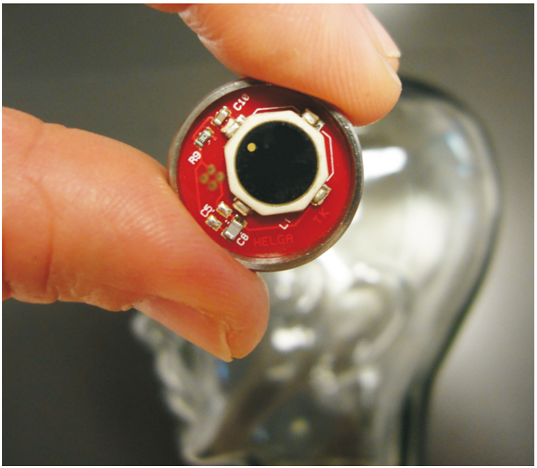A pressure switch inside the head
November 8, 2012

View of the unpackaged prototype intracranial pressure sensor (credit: Thomas Velten/Fraunhofer IBMT
An increase in cerebral pressure may cause dementia or even destroy the brain, but there’s no reliable sensor available (they quickly corrode), and current intracranial pressure systems keep patients in a hospital for days or weeks.
So Fraunhofer Institute for Biomedical Engineering (IBMT) researchers have developed a small implantable sensor for cerebral pressure that’s waterproof, using a casing made from high-grade titanium. It’s a cylinder that measures about 1×2 centimeters, and in the future, should get even smaller, the researchers say.
The cover is made from a pliable membrane that reacts to pressure changes in the brain. This pressure is sensed by a silicon chip inside and transmitted to an external measuring device via a radio signal.
The sensor operates without batteries (the external device provides the power), so the patient can wear it for several months, or even years, without requiring additional surgery.Usually, power to implanted chips (such as RFID chips embedded in animals) is delivered from a reader by inductive coupling to a small coil in the chip, with the energy stored in a capacitor. Dr. Thomas Velten, Head of Biomedical Microsystems at IBMT, confirmed that was the method they are using in an email to KurzweilAI.
What about a telemedicine connection to a clinic to avoid hospital visits? Velten said that currently, the reader is connected to a computer via USB. “For the future we plan to use a wireless link from reader to computer. Direct access to electronic patient record in a clinic is not planned, but this could be done if requested by a future user. Our institute (the group Home Care & Telemedicine) has expertise in the field of telemedicine.
“We are a research institute and we have just built the functional demonstrator device. If companies like the device and plan building a real product we will assist them.”
In that connection, IBMT researchers will demo the device (with a transparent plastic skull) at the Medica trade fair in Düsseldorf Nov. 14–17.
Background
It remains a mystery why the cerebral pressure in certain people suddenly increases. The consequences, however, are better understood: The blood circulation is disrupted and after a while, parts of the brain may die off, similar to what occurs in a stroke. Experts estimate that up to ten percent of all cases of dementia in Europe can be attributed to rising blood pressure in the brain.
People with a heightened susceptibility to a rise in intracranial pressure must be treated with intensive medical care today. A probe is inserted that goes from the outside through the skullcap to the brain. The cable keeps the patient connected to the measuring apparatus. Since cerebral pressure fluctuates, it takes extensive measurements in order to reach a definitive diagnosis of this disease. Patients therefore have to stay in hospital typically for several days, and sometimes weeks.
Medical device engineers have been working on an intracranial pressure probe that operates without a cable and can be read from the outside using radio wave transmission. But there is no established product on the market to this date for long-term implantation, because the sensors always have the same problem: Their casing — produced primarily from biologically accepted synthetics — allows moisture to penetrate, which destroys the sensor in just a few days — or even hours.